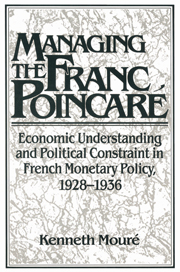 Managing the Franc Poincaré
Managing the Franc Poincaré Published online by Cambridge University Press: 23 November 2009
In 1931 the French bluntly rejected British suggestions of an international conference to coordinate efforts to combat the world depression. In 1933 France played a central role in both the organization and the failure of the World Economic Conference in London. French participation came about after dramatic changes in the world economy and international politics following the financial crises of 1931. The French opposition to an international economic conference in 1931 was based on fears of isolation and international pressures to redistribute gold reserves and concern that Germany would exploit such a forum to repudiate reparations. This genre of international cooperation held little attraction for the French.
By mid-1932 the French had less to fear from an international conference. The Gold Delegation's Final Report described uneven gold distribution as an “intermediate stage… which had its roots in war and inflationary disturbances of the economic system”, rather than a result of deliberate French policy and a cause of the crisis. Britain was less interested in a redistribution of gold reserves once the pound had gone off gold. The Lausanne conference in June 1932 effectively ended German reparations. The French remained suspicious of international economic cooperation, however. Pressure for a redistribution of gold reserves was still possible, and French understanding of the crisis allowed little opportunity for an international solution to the depression because remedies lay primarily in the realm of domestic policy. This combination of skepticism and suspicion marked French preparation for the World Economic Conference.
To save this book to your Kindle, first ensure [email protected] is added to your Approved Personal Document E-mail List under your Personal Document Settings on the Manage Your Content and Devices page of your Amazon account. Then enter the ‘name’ part of your Kindle email address below. Find out more about saving to your Kindle.
Note you can select to save to either the @free.kindle.com or @kindle.com variations. ‘@free.kindle.com’ emails are free but can only be saved to your device when it is connected to wi-fi. ‘@kindle.com’ emails can be delivered even when you are not connected to wi-fi, but note that service fees apply.
Find out more about the Kindle Personal Document Service.
To save content items to your account, please confirm that you agree to abide by our usage policies. If this is the first time you use this feature, you will be asked to authorise Cambridge Core to connect with your account. Find out more about saving content to Dropbox.
To save content items to your account, please confirm that you agree to abide by our usage policies. If this is the first time you use this feature, you will be asked to authorise Cambridge Core to connect with your account. Find out more about saving content to Google Drive.